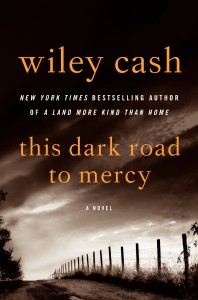What happens to a promising young athlete’s career when it comes to an end earlier than expected or hoped?
In major college athletics – football, basketball, and possibly baseball – almost every player hopes for a chance to play in the pros. Most won’t get it. Will the educational experience given in exchange for the play prepare these athletes as well or better for a life of work and service than the other alternatives available to them?
Wiley Cash’s new novel gives a painful look at one case involving the life of a promising athlete who tried an alternate route that did not work out well.
 Cash builds his second novel, This Dark Road to Mercy, on the personal disasters that followed the unsuccessful career of a fictional Gastonia minor league professional baseball player named Wade Chesterfield.
Cash builds his second novel, This Dark Road to Mercy, on the personal disasters that followed the unsuccessful career of a fictional Gastonia minor league professional baseball player named Wade Chesterfield.
Cash, who grew up in Gastonia, is still riding on the wave of his successful first novel, A Land More Kind than Home. That book told the tragic story of a little boy whose family was torn apart by its encounter with an unscrupulous, and indeed evil, preacher.
Cash used the voices of three characters to relate that story: the little boy, an older woman who tried to stand up to the preacher, and the local sheriff.
In the new book, he uses three narrative voices again.
First, the 12-year-old daughter of the failed baseball player tells how he deserted her, her mother, and her six-year-old sister. She refuses to refer to him as father or dad and calls him simply “Wade.” Although he had given up all parental rights, he reappeared after the mother’s death, kidnapped the two girls, and carried them along as he ran from two men who were determined to catch him.
One of them, a former policeman, was assigned by a court to represent the interests of girls as a volunteer “guardian ad litem.” He wants to bring them back to Gastonia where the proper authorities can settle the issue of where they belong and who should have custody. As the second narrator, his discussion of his own professional and family failures complicates and enriches the story.

Wiley Cash, photo by Tiffany B. Davis
The second pursuer is someone determined to kill Wade. He has two reasons. As a former baseball player himself, he was nearly blinded when one of Wade’s pitches hit him in the face. Now he seeks revenge. Secondly, a local Gastonia gangster offered him thousands of dollars to kill Wade and, if he could retrieve hundreds of thousands of dollars that Wade stole from the gangster, he would be paid more. The monies in Wade’s possession were only part of a larger heist that had been orchestrated by the gangster. Oh, there is a third reason, too. This second pursuer is evil personified. He enjoys killing. As Cash’s third narrator, this evil pursuer provides a unique and very troubling perspective on the story.
Cash weaves these differing versions into a single compelling tale. It follows Wade, the girls and their pursuers from Gastonia to Myrtle Beach, to Charleston, and to St. Louis, where the three strands of the story come together at a baseball game. Both Sammy Sosa and Mark McGwire are chasing Roger Maris’s home run record. While their teams play against each other, McGwire hits a home run that brings all the action to a surprising culmination.
Speaking of homers, Cash has hit another one.

